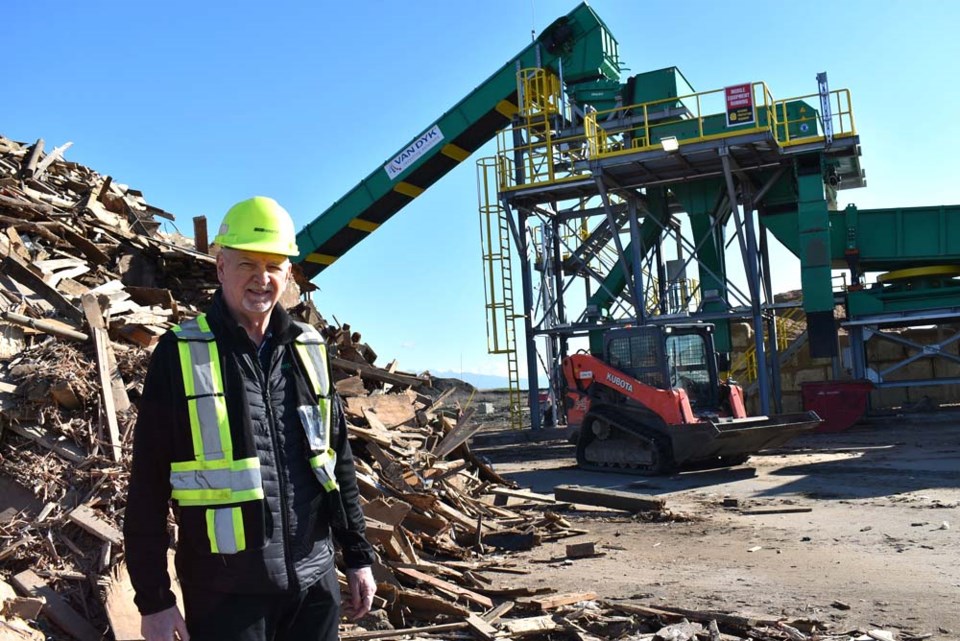A company that wants to benefit the environment via recycling is not being allowed to because the land they’re on needs to benefit farming instead.
The construction and demolition waste company Montrose Industries in Richmond is stuck in a regulatory bind, which may shut it down. Meanwhile, the region is running out of space to dump construction waste.
Montrose Industries (the parent company of EcoWaste), which owns multiple properties in east Richmond, was recently asking city council to support pulling one of its 150-acre parcels out of the Agricultural Land Reserve (ALR) so they could build a large-scale recycling facility for construction demolition waste, which, the company claimed, would reduce landfill in-fill by 60 to 70 per cent.
City council turned them down.
But this wasn’t before praising the company for its work and blaming the province for putting it in a bind that will force the company to start winding down operations next year.
Expansion caught in regulatory red tape
Montrose’s non-farm-use permit from the Agricultural Land Commission (ALC) to use the property as a landfill ends in 2035, but because they haven’t been able to build the recycling facilities – something they wanted in place already three years ago – their landfill is now almost at capacity.
Since Montrose’s permit was issued, the ALC regulations have changed to prohibit construction waste in the ALR.
Hence, when they asked the ALC to extend the permit to 2055 to build the six material recycling facilities on the property, they were turned down.
Montrose was planning to spend $50 to $100 million to build six material recovery facilities on the property, but this investment wouldn’t pay off if their permit wasn’t extended the extra 20 years.
Instead, in what would seem counter-intuitive, the ALC, an agency tasked with preserving farmland, suggested Montrose apply to the city to have it pulled out of the ALR, according to Montrose president Michael Kennedy, who cited letters from the ALC dating back to 2015 and 2020.
But a firm “no” – a unanimous decision from city council – has stopped that move in its tracks, and now Montrose’s only hope is if the province amends its regulations and allows them to continue operating until 2055.
The ultimate decision lies with the Ministry of Agriculture, which could change the regulations to allow Montrose an extension on its landfill operations. This would avoid the need to pull the land out of the ALR. (Former Montrose president Tom Land told the News previously there is a plan in place to return the land to agricultural viability when the landfill eventually closes, whenever that is.)
Kennedy told Richmond city council that the Ministry of Agriculture is apparently looking at a “range of options,” but the uncertainty around what their decision will be and when it will be made leaves them few choices, and most likely, they will shut down the landfill.
City councillors, at a recent planning meeting, told the Montrose executives they don’t want to have the land pulled out of the ALR as that goes against the city’s policies.
Both Couns. Andy Hobbs and Bill McNulty placed the responsibility of the bind Montrose finds itself in on the provincial Ministry of Agriculture.
“I think the province has an issue to deal with… one of their own creation,” Hobbs said. “And I think, by and large, it’s incumbent on them to find a solution that works best.”
'All hell is going to break loose'
In an extensive report to city council, city staff recommended they deny the ALR exclusion application as it goes against its farming policies of encouraging agricultural production and maintaining current farmland boundaries.
City staff cautioned that pulling the land out of the ALR could cause more farmland speculation, increase pressure to exclude other ALR properties, and increase the likelihood of this property becoming industrial after the recycling and landfill operation shut down.
Furthermore, they say a proposed compensation package from Montrose Industries of $3.25 million is “insignificant compared to the potential tenfold increase in the site value that could be realized.”
This point was reiterated by Coun. Harold Steves, who estimated the property would be worth $1 billion if it were pulled out of the ALR and rezoned as industrial land is selling at $7 million per acre.
“As far as I’m concerned, if the government did remove this land out of the ALR, all hell is going to break loose,” Steves said.
In fact, Steves pointed out Country Meadows Golf Course, also in the ALR, used to be a demolition site for old cars, now it’s a golf course, and perhaps later, it will return to farming.
There are few places in the Lower Mainland to take demolition waste – Montrose is one, and the Vancouver Landfill in Delta is another, and even that is scheduled to close in 2032 and would prefer to take household waste, Kennedy explained.
One option is to take demolition waste to facilities in Washington State.



